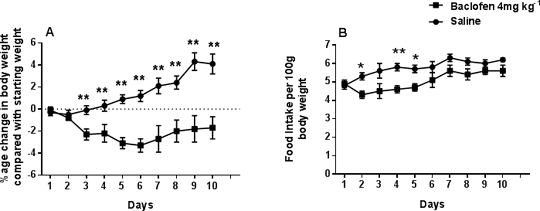Effects of chronic intraperitoneal administration of the GABAB receptor agonist baclofen on food intake and body weight in fasted rats.
It has previously been reported that chronic systemic administration of the GABAB receptor agonist baclofen(bac) reduces body weight in free-feeding rats but does not affect daily (24h) food intake (1). It has therefore been suggested that the drug may decrease body weight by increasing metabolic rate. In the present study, which was ethically approved, the effects of chronic administration of bac on food intake and body weight were investigated in rats given access to food for 3h each day in order to determine whether the drug would affect body weight under conditions of restricted access to food. Male Wistar rats (n=16, b, wt. 250 – 350g) that were given free access to water but fasted in their home cages for 21h each day, were divided into two equal groups. They were injected ip. with either physiological saline solution (Control Group) or bac (4 mg kg-1) and placed individually in experimental cages with free access to food and water for 3h each day for 10 days; food intake was recordedas described previously (1). Body weight was measured prior to the start of each feeding session and expressed as percentage change relative to the body weights recorded prior to the start of treatments (see ref. 1 for details). Daily food intake and body weight data were analysed by ANOVA and post-hoct-tests. Daily administration of bac significantly reduced body weight gain compared with controls starting on treatment Day 3 (Fig. 1A). Bac treatment also produced significant decreases in food intake on Days 2,4 and 5 (Fig.1B). This may have been caused by sedative / motor effects of the drug competing with feeding behaviours (1). However, there was no significant effects on food consumption between the 2 groups on Days 6 to 10, suggesting that tolerance had occurred to the sedative / motor effects (see ref. 1). It is possible that the decrease in food intake during the early period of the experiment may have been partly responsible for the reduction in body weight in the baclofen-treated animals. However, the observation that the bac-treated rats did not gain weight during the latter part of the study when there was no significant differences in food consumption between the 2 groups, gives further credence to the view that the drug decreases body weight by increasing metabolic rate (1). These data further suggest the possibility that GABAB agonists, such as bac, may be useful in the treatment of obesity.
Figure 1. Effects of chronic administration of baclofen on (A) body weight and (B) food intake. Vertical line represent ± se. mean. *P<0.05; **P<0.01
(1) Patel, S.M. and Ebenezer, I.S. (2010) Eur J Pharmacol. 635: 129 – 134.
|



